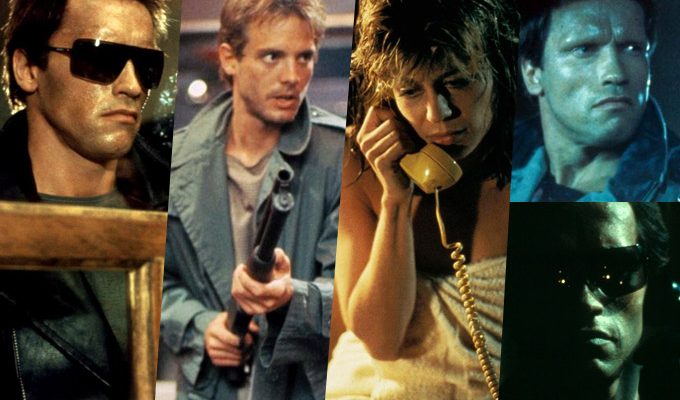 Exactly 30 years ago this coming Sunday, a low-budget sci-fi B-movie, for which the releasing studio had but low expectations, directed by the unheralded filmmaker behind “Piranha II: The Spawning,” starring a heavily accented ex-Mr Universe, opened on just over a thousand screens across the U.S. Spin forward three decades and we can rewrite almost every element of that sentence: instead of a down-and-dirty sci-fi cheapie, we’re talking about a franchise-starting behemoth that would spawn sequels, reboots, TV shows, arcade games and other merchandise, all adding up to one of the most lucrative properties the movies have ever seen.
Exactly 30 years ago this coming Sunday, a low-budget sci-fi B-movie, for which the releasing studio had but low expectations, directed by the unheralded filmmaker behind “Piranha II: The Spawning,” starring a heavily accented ex-Mr Universe, opened on just over a thousand screens across the U.S. Spin forward three decades and we can rewrite almost every element of that sentence: instead of a down-and-dirty sci-fi cheapie, we’re talking about a franchise-starting behemoth that would spawn sequels, reboots, TV shows, arcade games and other merchandise, all adding up to one of the most lucrative properties the movies have ever seen.
The neophyte filmmaker of course grew up to be James Cameron, world-conquering director of both the number one and number two highest-grossing films of all time; the bodybuilder/punchline Arnold Schwarzenegger became the biggest star in the world prior to becoming Governator of California; and far from trading in low expectations, these days the various studios who’ve had a hand in the franchise to date have fallen over themselves to mount ever more expensive and involved sequels and spin offs to wildly varying levels of success. Indeed, next year we’ll see the reboot, beg pardon, reset “Terminator: Genisys” come to screens on July 1, 2015. (Which means there’s still plenty of time to do something about that awful title, guys! No one will judge you harshly for changing it!) Loving the original as much as we do, and wanting to mark the occasion of its 30th birthday, we thought we’d take an appreciative look back at the film that started it all, the little movie that could (and did): 1984’s “The Terminator.”
The first thing to note is just how well the film holds up over time. No doubt relentlessly perfectionist technophile James Cameron might look at it today and cringe, and for sure the practical effects, especially the jerky stop-motion animation and the model building of Schwarzenegger’s head when half his skull is blown away to reveal his metal endoskeleton and skull, are pretty rough around the edges to a modern eye. But they also have a handmade, in-camera charm to them, and if they momentarily take you out of the film nowadays, what’s remarkable is how little that matters, even on the fifth or sixth or twenty-seventh viewing. As much as Cameron has subsequently earned a reputation for astonishing effects work, there’s a reason he, and not King of Empty Spectacle Michael Bay, for example, holds those two top spots in the box office pantheon. Cameron seems (at times almost grudgingly) to know that whatever his own predilections, audiences want story.

He seldom gets the props as a storyteller that he deserves, but the fact is that as unsubtle and broad strokes as they may be, his films invariably follow classic, resonant narrative arcs for which his pioneering technological gloss is merely the window dressing. Arguably back in 1984 when the financing he could hope to get was of an order that probably wouldn’t cover the chihuahua budget on the “Avatar” sequels (yes I know there are no chihuahuas in “Avatar,” but only a fool would definitively conclude that there’s therefore no chihuahua budget), story took a primacy that he’s never truly embraced as much since. “The Terminator” is not just a good yarn, it’s a complex, layered and surprisingly thoughtful one, especially for a film so lean, boasting such relentless forward momentum.
Back in the day, of course, the provenance of that story was controversial. Cameron maintains that the idea evolved from a dream he had, as related to his biographer Rebecca Keegan in “The Futurist: The Life and Times of James Cameron.” But on seeing the finished film, already well on its way to becoming a cult hit, writer Harlan Ellison sued Orion, claiming that the film was based on an episode of “The Outer Limits,” titled “Soldier,” that he had written. “Soldier” does indeed have some shared elements, such as two relentless killers being sent back in time where one eventually sacrifices himself to rid the “present” of the other, but beyond that the similarities are not all that marked. In fact, the real strength of “The Terminator” is in the interesting way it plays with determinism — both the machine and Kyle Reese (Michael Biehn) are sent back in time deliberately by their superiors, and in so doing they create an unbreakable Grandfather Paradox loop of inescapable destiny; in “Soldier” the men are both accidentally beamed away from the battlefield of the future, one to 1964 and the other to a kind of gradually decaying limbo.

